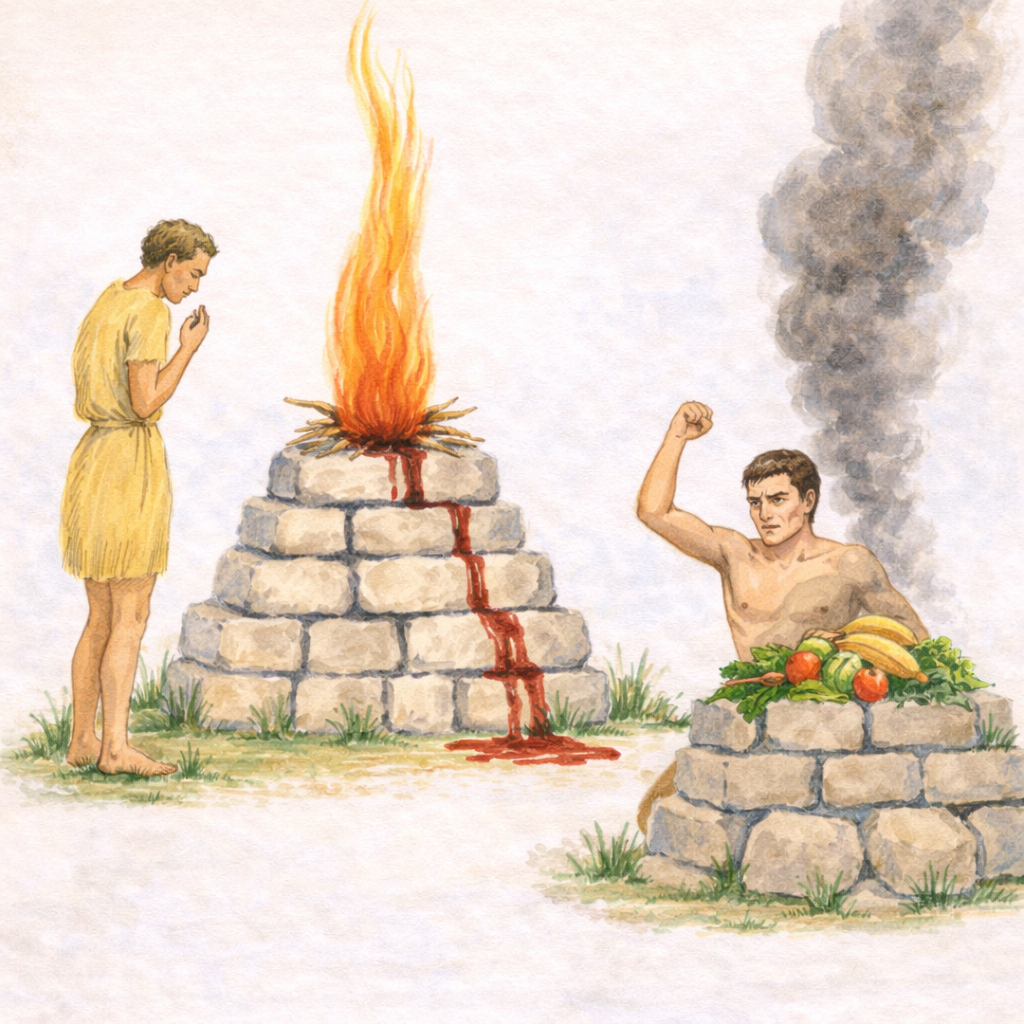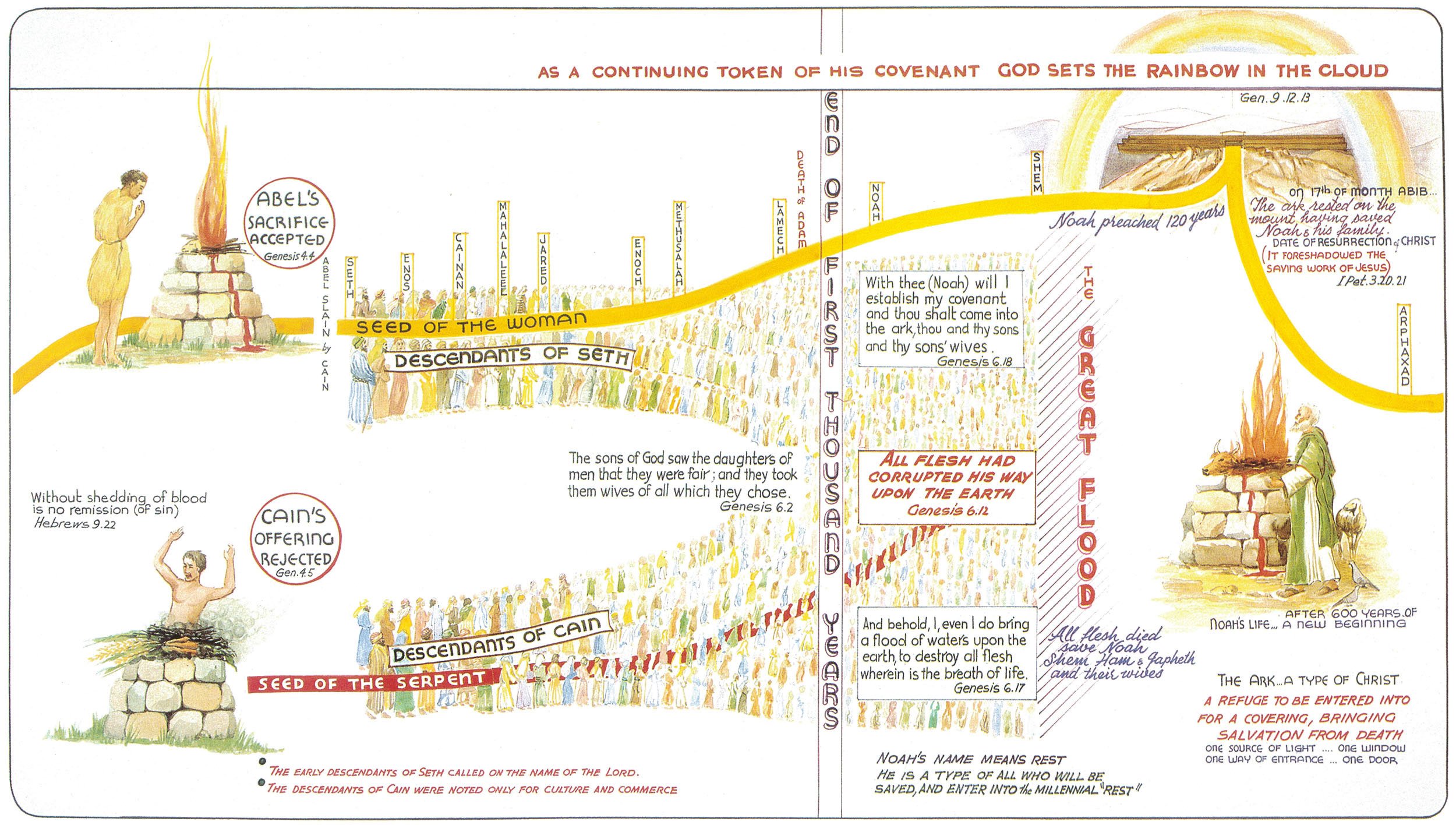Cain and Abel
A Lesson in Acceptable Worship of God
After Adam and Eve were driven from the garden of Eden, Eve gave birth to two sons, first Cain and then Abel. We are given specific details of the occupations that these two men pursued. Abel was a shepherd, whereas Cain was involved in horticulture or farming (Genesis 4:1–2).
Genesis 4:3 “In process of time” The Hebrew expression means “at the end of days”. This tells us that there was a set time for them to present an offering to God in worship.
“Cain brought of the fruit of the ground an offering unto the LORD” No doubt Cain selected for his offering the best fruit he had grown. He was sure that God would accept what he wanted to offer Him.
Genesis 4:4 “Abel also brought of the firstlings of his flock and of the fat thereof” These details indicate that not only did Abel understand that he was to offer an animal, but he knew that God had made known the way to worship acceptably. He understood that the fat must be offered, which became a special feature later of the sacrifices under the Law of Moses (Leviticus 3:16–17). Offering the firstborn of the flock was also a feature of that Law (Exodus 13:2,12–15). Evidently these details had been explained to both Cain and Abel. So Abel made his offering because he not only understood what God required, but also wanted to please Him.
“The LORD had respect unto Abel and to his offering” Note the order that is set out here. The Lord first “had respect to” Abel, that is, He was pleased with the spirit that motivated him in his worship; then He had respect to the offering because it represented Abel’s understanding and obedience to his God. God did not require the sacrifice of animals as an end in itself (Psalm 50:8–14). What God required was a heart that understood the significance of sacrifice.
Genesis 4:5 “But unto Cain and to his offering he had not respect”
Again we note that God “had not respect” first to Cain, because of the frame of mind with which he brought his offering, and then to the offering itself which was not what God required.
What are the lessons for us?
We have already seen these same principles set out in Genesis 3. After Adam and Eve sinned they invented their own covering for their nakedness. (We saw there that nakedness was typical of sin.) God showed that the covering of fig leaves for sin was unacceptable to Him and provided coats of skin. God had been wronged and only He could establish the basis for the forgiveness of sin.
The word “religion” means “to rebind” and therefore to restore a person into fellowship with God. Since it was man who wronged God, it is not for man to design his religion. What man must do is find out what God requires. The many forms of religion in the world today reveal the many attempts men have made to formulate their own way back to God. These attempts are no better than the fig leaf covering that Adam and Eve made to try to cover their nakedness.
When God provided “coats of skins” for Adam and Eve, He was indicating that “the shedding of blood” was the basis for the forgiveness of sin (Hebrews 9:22). The lamb slain to provide their covering foreshadowed Jesus Christ, the promised Redeemer whom God would send “to take away the sin of the world” (John 1:29; 1 Peter 1:19–20; Revelation 13:8). When Cain and Abel approached God in worship they needed to acknowledge that they were sinners in need of the covering God would provide.
Abel offered in faith and his faith was acceptable in God’s sight: “By faith Abel offered unto God a more excellent sacrifice than Cain” (Hebrews 11:4; Matthew 23:35). Paul points out that “without faith it is impossible to please God” (Hebrews 11:6). Cain appears to have offered what he thought God should accept. Possibly it was the very best of his fruits, but it was not what God required. No doubt he was proud of what he had to offer, but it did not reflect faith and obedience to God’s requirements. His offering was therefore not accepted. Abel’s offering was accepted because it was what God asked.
Here we have the first example of faithful obedience to God. A man cannot honour God more than in believing what He promises and doing what He commands. Abel’s offering showed his faith in God’s promise of the Redeemer and his action demonstrated his faith.
Genesis 4:7 “If thou doest well, shalt thou not be accepted?” God is indeed just, but merciful as well. A change of heart on Cain’s part and making the right offering could restore him to favour with God. But Cain was by now eaten out with hatred for his brother and he murdered him (Genesis 4:8). “And wherefore slew he him? Because his own works were evil, and his brother’s righteous” (1 John 3:10–12; Jude 11). This clearly shows that enmity at work which came about as a direct result of sin entering the world (Genesis 3:15).
The Family of Cain and Seth
The family of Cain contrasted with that of Seth (Genesis 4 and 5)
After the tragic death of Abel, Adam and Eve had another son named Seth (Genesis 4:25–26). The genealogies of these two sons are set out in detail for us. Cain’s genealogy is recorded in Genesis 4:17–23 and Seth’s is found in Genesis 5.
There is one point that is particularly worth noting. The seventh from Adam in Cain’s line was Lamech. Of him it is recorded that he was the first polygamist (having more than one wife) in the Bible (Genesis 5:19). Also he was a vengeful man, threatening to physically punish anyone who withstood him (Genesis 5:23). However, in the line of Seth the seventh from Adam was Enoch (Genesis 5:21–24). It is recorded of him that he “walked with God”. We are also told that he was a prophet of God and spoke against the ungodliness that was so widespread in the earth (Jude 14–15). In contrast to the prevalent wickedness in the line of Cain there were those who, like Enoch, endeavoured to walk in God’s ways (Hebrews 11:5).
The Seed of the Serpent and the Seed of the Woman
The principle of Genesis 3:15, of two seeds, the seed of the serpent and the seed of the woman, which would spring forth in the world, has now well developed. There were those who pleased themselves, indulging in whatever their heart desired (the “seed” of the serpent), and those like Enoch who endeavoured to walk in the ways of God (the “seed” of the woman). Between these two classes there was that enmity that God had foretold. That enmity will always exist between those who follow the ways of sin and those who strive to obey God and keep His ways.
Adapted from “The Exploring the Bible Course” by David Evans

